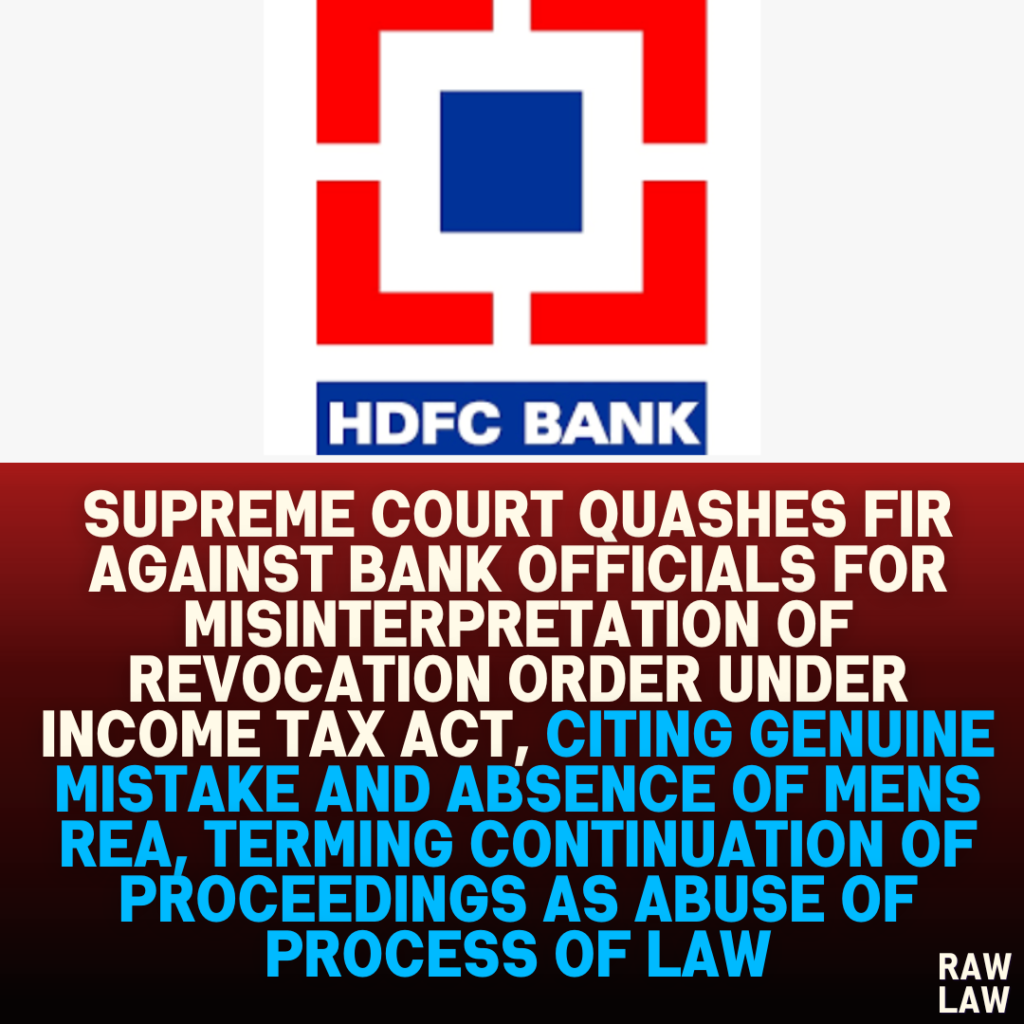Court’s Decision:
The Supreme Court quashed the First Information Report (FIR) against the officials of a bank branch accused of breaching a restraint order under the Income Tax Act. The Court held that the allegations did not prima facie constitute the offences charged under the Indian Penal Code (IPC), emphasizing that the FIR failed to establish the requisite mens rea for the alleged crimes. The continuation of the criminal proceedings would cause undue hardship to the bank, and as such, both the High Court judgment and the FIR were quashed.
Facts:
The case arose from a search and seizure operation conducted in October 2021 by the Income Tax Department at the premises of certain individuals. A restraint order under Section 132(3) of the Income Tax Act was issued, prohibiting the operation of bank accounts, lockers, and fixed deposits. Later, a revocation order allowed the individuals to operate their bank accounts but did not explicitly mention bank lockers.
The officials of the bank allowed one of the individuals to operate their locker, misinterpreting the revocation order as extending to lockers. Following this, the Income Tax Department discovered the operation of the locker, leading to the registration of an FIR against the bank officials for alleged criminal breach of trust and other offenses under the IPC.
Issues:
- Whether the FIR disclosed prima facie evidence of the bank officials’ criminal intent (mens rea) to justify the charges under the IPC.
- Whether the High Court erred in dismissing the petition to quash the FIR.
Petitioner’s Arguments:
The petitioner, representing the bank, argued that:
- The FIR did not disclose any mens rea on the part of the bank officials.
- The misinterpretation of the revocation order was a bona fide error, and there was no fraudulent or dishonest intention involved.
- The continuation of the criminal proceedings was unjust and amounted to undue hardship.
Respondent’s Arguments:
The respondents argued that:
- The bank officials had violated the restraint order by allowing the locker operation, which constituted an offense under the IPC.
- The High Court had rightly dismissed the petition, as it was not appropriate for the Court to interfere in an ongoing investigation.
Analysis of the Law:
The Court emphasized that for an offense under Section 420 of the IPC (cheating), there must be fraudulent or dishonest inducement from the beginning, and for criminal breach of trust under Section 409 IPC, there must be misappropriation or dishonest conversion of property. The Court found that the FIR did not allege that the bank or its officials induced anyone fraudulently or misappropriated property.
Precedent Analysis:
The Court referred to Bhajan Lal v. State of Haryana, laying out categories where quashing of FIR is warranted, particularly where allegations do not disclose a cognizable offense or make out a case against the accused. The case was found to fall within these categories.
Court’s Reasoning:
The Court held that the misinterpretation of the revocation order by the bank officials was a genuine mistake, and there was no evidence of mens rea. As the FIR did not disclose any fraudulent intent or dishonest conduct on the part of the bank officials, the continuation of criminal proceedings would amount to an abuse of the process of law.
Conclusion:
The Court allowed the appeal, quashing the High Court’s judgment and the FIR, stating that the proceedings caused undue hardship to the bank and its officials.
Implications:
This judgment reiterates the importance of mens rea in criminal proceedings under the IPC and sets a precedent that mere inadvertent mistakes, in the absence of fraudulent intent, do not constitute a criminal offense. It highlights that courts must carefully scrutinize FIRs to ensure that they disclose the essential ingredients of the alleged offense before allowing criminal proceedings to continue.




Pingback: Jammu and Kashmir High Court Sets Aside Lower Court’s Orders, Allows Petitioner to Lead Evidence After 14-Year Delay – Emphasizes Fairness Over Procedural Lapses: “Non-Compliance Should Not Always Cause Hardship, Denying Evidence Would Cause Undue H